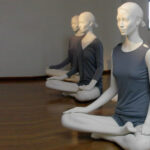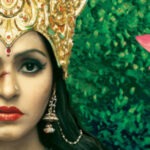
Cameron Shayne Is So Totally His Body. And Bodies Are Political.
September 27, 2013
Interrogating Yoga’s Binaries through Ayurveda, Feminism, and Queer Theory (a draft of some ideas I hope to get lots of help with)
October 3, 2013(Some good sources, both popular and academic, I use for my coursework and consultation work… Not a complete list — please feel free to add favourites in the comments!)
Alter, Joseph S.. Yoga in modern India: the body between science and philosophy. Princeton, N.J.: Princeton University Press, 2004. Print.
Arikha, Noga. Passions and tempers: a history of the humours. New York, NY: Ecco, 2007. Print.
Atreya. Perfect balance: ayurvedic nutrition for mind, body, and soul. New York: Avery, 2001. Print.
Chatwin, Bruce. The songlines. New York: Viking, 1987. Print.
Das, Rahul Peter. The origin of the life of a human being: conception and the female according to ancient Indian medical and sexological literature. Delhi: Motilal Banarsidass Publishers, 2003. Print.
Doniger, Wendy. Hindu myths: a sourcebook. Harmondsworth: Penguin, 1975. Print.
Doniger, Wendy. The Rig Veda: Wendy Doniger.. London: Penguin, 2005. Print.
Doniger, Wendy. The Hindus: an alternative history. New York: Penguin Press, 2009. Print.
Fields, Gregory P. Religious therapeutics body and health in Yoga, Ayurveda, and Tantra. Albany: State University of New York, 2001. Print.
Foucault, Michel. The birth of the clinic; an archaeology of medical perception.. [1st American ed. New York: Pantheon Books, 1973. Print.
Frawley, David. Yoga and Ayurveda Advanced Course. Santa Fe: American Institute of Vedic Studies, 2000. Print.
Frawley, David. Tantric yoga and the wisdom goddesses: spiritual secrets of ayurveda. Salt Lake City, Utah: Passage Press, 1994. Print.
Frawley, David. Ayurveda and the mind: the healing of consciousness. Twin Lakes, Wis.: Lotus Press, 1997. Print.
Frawley, David. Ayurvedic Healing Course. Santa Fe: American Institute of Vedic Studies, 1998. Print.
Frawley, David. Ayurvedic healing: a comprehensive guide. 2nd rev. and enl. ed. Twin Lakes, Wisc.: Lotus Press, 2000. Print.
Frawley, David, and Sandra Summerfield Kozak. Yoga for your type: an Ayurvedic approach to your Asana practice. Twin Lakes, WI: Lotus, 2001. Print.
Frawley, David. Ayurvedic astrology: self-healing through the stars. Twin Lakes, Wisc.: Lotus Press, 2005. Print.
Johari, Harish. Ayurvedic massage: traditional Indian techniques for balancing body and mind. Rochester, Vt.: Healing Arts Press, 1996. Print.
Kacera, Walter. Ayurvedic tongue diagnosis. Twin Lakes, Wis.: Lotus Press, 2006. Print.
Kakar, Sudhir. Shamans, mystics, and doctors: a psychological inquiry into India and its healing traditions. New York: Knopf, 1982. Print.
Khalsa, Karta Purkh Singh, and Michael Tierra. The way of ayurvedic herbs: the most complete guide to natural healing and health with traditional ayurvedic herbalism. Twin Lakes, Wis.: Lotus, 2008. Print.
Lad, Usha, and Vasant Lad. Ayurvedic cooking for self-healing. 2nd ed. Albuquerque, N.M.: Ayurvedic Press, 1997. Print.
Lad, Vasant. Ayurveda: the science of self-healing : a practical guide. Santa Fe, N.M.: Lotus Press, 1984. Print.
Lad, Vasant, and David Frawley. The yoga of herbs: an Ayurvedic guide to herbal medicine. Santa Fe, N.M.: Lotus Press, 1986. Print.
Lad, Vasant. The complete book of Ayurvedic home remedies. New York: Harmony Books, 1998. Print.
Lad, Vasant. Textbook of Ayurveda. Albuquerque, N.M.: Ayurvedic Press, 20022012. Print.
Lad, Vasant, and Glen Crowther. Ayurvedic perspectives on selected pathologies: an anthology of essential reading from ayurveda today. Albuquerque, NM: Ayurvedic Press, 2005. Print.
Langford, Jean. Fluent bodies: Ayurvedic remedies for postcolonial imbalance. Durham: Duke University Press, 2002. Print.
Leslie, Charles M. Asian medical systems: a comparative study. Berkeley: University of California Press, 1976. Print.
Mazars, Guy. A Concise Introduction to Indian Medecine. Delhi: Motilal Banarsidass Publishers, 2006. Print.
Meulenbeld, Gerrit Jan, and D. Wujastyk. Studies on Indian medical history. Reprint ed. Delhi: Motilal Banarsidass, 2001. Print.
Morningstar, Amadea, and Urmila Desai. The Ayurvedic cookbook: a personalized guide to good nutrition and health. Santa Fe, NM: Lotus Press, 1990. Print.
Mukherjee, Siddhartha. The emperor of all maladies: a biography of cancer. New York: Scribner, 2010. Print.
Pitman, Vicki. The nature of the whole: holism in ancient Greek and Indian medicine. Delhi: Motilal Banarsidass Publishers, 2006. Print.
Pole, Sebastian. Ayurvedic medicine: the principles of traditional practice. London: Singing Dragon, 2013. Print.
Ranade, Subhash, and Sunanda Ranade. Ayurveda and Yoga therapy. Pune: Anmol Prakashan, 1995. Print.
Ranade, Subhash, and David Frawley. Natural healing through Ayurveda. Delhi: Motilal Banarsidass Publishers Private Limited, 1999. Print.
Ranade, Subhash, and Sunanda Ranade. Concept of Ayurvedic physiology: (sharira kriya). Pune: R.D. Nandurkar, 2003. Print.
Sharma, Priya V.. Caraka-saṃhitā: Agniveśa’s treatise refined and annotated by Caraka and redacted by Dṛḍhabala : text with Engl. transl.. Varanasi: Chaukhambha Orientalia, 1981. Print.
Stiles, Mukunda. Ayurvedic yoga therapy. Twin Lakes, Wis.: Lotus, 2007. Print.
Svoboda, Robert. Prakriti: your Ayurvedic constitution. Albuquerque, N.M.: GEOCO, 1988. Print.
Svoboda, Robert, and Arnie Lade. Chinese medicine and ayurveda. Delhi: Motilal Banarsidass, 1998. Print.
Tiwari, Maya. Ayurveda: a life of balance : the complete guide to ayurvedic nutrition and body types with recipes. Rochester, Vt.: Healing Arts Press, 1995. Print.
Tiwari, Maya. Ayurveda secrets of healing: the complete Ayurvedic guide to healing through Pancha Karma seasonal therapies, diet, herbal remedies, and memory. Twin Lakes, Wis.: Lotus Press, 1995. Print.
Verma, Vinod. The Kamasutra for women: the modern woman’s way to sensual fulfillment and health. New York: Kodansha International, 1997. Print.
Verma, Vinod. Ayurveda for life. Delhi: Motilal Banarsidass ;, 2001. Print.
White, David Gordon. The alchemical body: Siddha traditions in medieval India. Chicago: University of Chicago Press, 1996. Print.
Wujastyk, D.. The Roots of Ayurveda: selections from Sankskrit medical writings. Rev. ed. London: Penguin Books, 2003. Print.
Wujastyk, Dagmar, and Frederick M. Smith. Modern and global Ayurveda: pluralism and paradigms. Albany: State University of New York Press, 2008. Print.
Wujastyk, Dagmar. Well-mannered medicine: medical ethics and etiquette in classical Ayurveda. New York: Oxford University Press, 2012. Print.
Zimmermann, Francis. The jungle and the aroma of meats: an ecological theme in Hindu medicine. Berkeley: University of California Press, 1987. Print.
Zysk, Kenneth G.. Religious healing in the Veda: with translations and annotations of medical hymns in the Rgveda and the Atharvaveda and renderings from the corresponding ritual texts. Philadelphia, Pa.: American Philosophical Society, 1985. Print.
Zysk, Kenneth G.. Asceticism and healing in ancient India: medicine in the Buddhist monastery. New York: Oxford University Press, 1991. Print.
Zysk, Kenneth G.. Religious medicine: the history and evolution of Indian medicine. New Brunswick (U.S.A.): Transaction Publishers, 1993. Print.